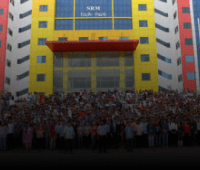B. Tech. Honors in GPU -Accelerated Computing

The B.Tech. (Honors) in GPU-Accelerated Computing program is designed to equip students with cutting-edge skills in high-performance computing (HPC), parallel programming, and hardware-accelerated data processing. The curriculum emphasizes the design and development of parallel algorithms and the implementation of GPU computing techniques to achieve enhanced computational efficiency.
Students will gain hands-on experience with shared and distributed computing platforms such as OpenMP, MPI, and others, enabling them to execute parallel programming methods effectively. The program gives special focus to state-of-the-art hardware including Graphics Processing Units (GPUs), Tensor Processing Units (TPUs), and Field Programmable Gate Arrays (FPGAs), all of which play a critical role in accelerating computation.
This program is ideal for students aiming to build careers in scientific computing, AI/ML engineering, data science, and high-performance system design.
- To understand the power of parallelism and OpenMP framework
- To understand the design and implementation strategies of various applications of complex problems using MPI
- To harness the parallel computing facilities for numerical methods with OpenMP and MPI
- To understand the introductory level of understanding of GPU hardware and software architectures.
- To study the basics of concurrent programming in Python and C programming languages.
- To understand and to apply CUDA and OpenACC over the massively parallel hardware like GPU.
- To execute AI/ML applications using parallel programming models to
- At the successful completion of this Honors program student will be able to
- Understand different parallel processing approaches and issues involved in HPC and GPU computing.
- Design applications on different GPU platforms to solve real time projects
- Apply concepts of GPU to perform pre-processing, feature extraction and AI/ML on voluminous datasets.
- Apply the process of parallel processing of data using OpenMP and MPI
- Evaluate the performance of GPU using CUDA and OpenACC.
- Identify and resolve performance issues and bugs related to CUDA usage.
- Analyze and improve algorithm performance through efficient parallelization in HPC applications
- New technologies and best practices in CUDA, CUDA Performance Optimization and parallel computing.
- Experience with code optimization for performance and efficient resource usage.
- Knowledge of frameworks and libraries like cuBLAS and cuDNN.
- Design robust high performant cloud-based software architecture systems involving CPU/GPU workloads, scalable/robust storages, high-bandwidth inter-connects
B.Tech Honors in Geospatial Intelligence

The B.Tech. (Honors) in Geospatial Intelligence (GEOINT) program focuses on the use of geographic information and geospatial technologies to collect, analyze, and interpret spatial data for strategic decision-making.
GEOINT integrates data from multiple sources, including satellite imagery, aerial surveillance, maps, and GPS coordinates, to generate actionable insights. This interdisciplinary field supports critical operations in military and defense, national security, disaster response, and environmental monitoring.
Students will gain hands-on experience with modern geospatial tools and techniques, learning how to leverage spatial data for real-world applications such as threat assessment, emergency planning, and resource management. The program is designed to produce skilled professionals capable of addressing complex challenges using location-based intelligence.
- To provide a strong foundation in geospatial technologies, including GIS, remote sensing, satellite imagery analysis, and GPS-based data collection.
- To develop the ability to analyze and interpret spatial data for informed decision-making in areas such as defense, disaster management, environmental monitoring, and urban planning.
- To integrate multidisciplinary knowledge from geography, computer science, and data analytics to address real-world problems using geospatial intelligence.
- To train students in the use of modern tools and software for geospatial mapping, modeling, and visualization.
- To promote awareness of national and global security concerns, and how geospatial intelligence contributes to surveillance, reconnaissance, and strategic planning.
- To encourage critical thinking and research skills for innovation in geospatial applications and the development of location-based solutions.
- Apply geospatial technologies such as GIS, remote sensing, and GPS to collect, manage, and analyze spatial data.
- Interpret satellite imagery and aerial data to generate actionable insights for applications in defense, disaster management, and environmental monitoring.
- Utilize geospatial software and tools for mapping, spatial modeling, and data visualization.
- Integrate spatial data with AI/ML techniques to support advanced analytics and predictive modeling.
- Design and implement geospatial solutions to address real-world challenges in areas like urban planning, resource management, and homeland security.
- Geographic Information Systems (GIS): Proficiency in mapping, spatial analysis, and geospatial database management.
- Remote Sensing & Satellite Image Processing: Skills to interpret and analyze data from satellite and aerial imagery.
- Global Positioning Systems (GPS) & Navigation: Expertise in location tracking, route optimization, and geolocation services.
- Geospatial Data Analytics: Applying statistical and machine learning techniques to extract meaningful patterns from spatial data.
- Geospatial Software & Tools: Hands-on experience with industry-standard platforms like ArcGIS, QGIS, ERDAS Imagine, ENVI, and Google Earth Engine.
- Application Development: Building location-based solutions for real-world challenges using geospatial APIs and programming tools.
B.Tech Honors in Financial Technologies

The B.Tech. (Honors) in Financial Technologies offered by the Department of Computing Technologies, School of Computing, SRM Institute of Science and Technology (SRMIST), is a specialized program crafted to bridge the gap between finance and cutting-edge technology.
The curriculum includes key areas such as Programming for FinTech, Financial Foundations, Algorithmic Trading, and Regulatory Compliance. It also incorporates emerging technologies like Artificial Intelligence (AI), Blockchain, and Design Thinking, preparing students for innovation in the rapidly evolving fintech industry.
This honors program is offered to select second-year CSE students with an excellent academic track record. Currently, around 30 students are enrolled, gaining hands-on experience and expertise needed to thrive in the global financial technology landscape.
- To provide a strong foundation in the principles of finance, financial markets, and regulatory frameworks.
- To develop programming and analytical skills required to build fintech applications.
- To expose students to technologies such as Blockchain, AI/ML, and Cloud Computing relevant to the fintech industry.
- To foster innovation through methodologies like Design Thinking and Agile Development.
- To prepare students for roles in algorithmic trading, financial analytics, digital banking, and fintech entrepreneurship.
- To encourage problem-solving and critical thinking through real-world fintech projects and case studies.
- Demonstrate a solid understanding of financial systems, markets, and instruments.
- Apply programming skills in Python, R, or similar languages to develop fintech solutions.
- Build and deploy AI/ML models for financial data analysis and prediction.
- Implement blockchain-based applications with a focus on security and transparency.
- Analyze and comply with fintech regulations and policies.
- Work collaboratively on fintech innovation projects using design and development best practices.
- Graduates of this program can pursue careers in roles such as:
- Fintech Software Developer
- Blockchain Developer
- Financial Data Analyst
- Quantitative Analyst (Quant)
- Regulatory Technology (RegTech) Specialist
- AI/ML Engineer – Fintech Sector
- Product Manager – Digital Finance Platforms
- Start-up Founder / Fintech Entrepreneur
B.Tech Honors in Quantum Computing

The B.Tech. (Honors) in Quantum Computing is an advanced program tailored for academically exceptional students with a passion for next-generation technologies. It provides a strong foundation in quantum mechanics, linear algebra, and quantum algorithm design, integrating both theoretical and practical learning. Students gain hands-on experience using leading quantum programming platforms such as Qiskit, Cirq, and Rigetti Forest. The program explores emerging applications in quantum cryptography, quantum communication, and quantum sensing, preparing students to tackle real-world challenges. Emphasis is placed on research, innovation, and critical thinking, equipping graduates for roles in top quantum technology firms or further studies in quantum science.
- To train students in designing, simulating, and testing quantum algorithms using real-world quantum programming environments.
- To provide exposure to quantum computing hardware and simulators, preparing students for practical implementation.
- To foster innovation through research in quantum applications, including quantum AI, quantum cryptography, and quantum networks.
- To enhance analytical and critical thinking by engaging with current quantum literature and solving advanced problems.
- To build collaborative and independent research capabilities through projects, seminars, and industry/research internships.
- To prepare students for seamless transition into Ph.D. programs or quantum-focused industry roles.
- Understand and apply fundamental principles of quantum mechanics in the context of computing and information science.
- Design and implement quantum algorithms for solving complex computational problems using platforms like Qiskit and Cirq.
- Analyze and simulate quantum systems and circuits, interpreting their behavior and performance.
- Apply mathematical tools such as linear algebra, probability, and complex numbers to model quantum processes.
- Use quantum programming environments and simulators to test and debug quantum applications.
- Critically evaluate research literature and emerging technologies in quantum computing, cryptography, and communication.
- Quantum Mechanics & Quantum Information Theory – Understanding core principles such as superposition, entanglement, and quantum gates.
- Quantum Programming & Algorithms – Hands-on proficiency with tools like Qiskit, Cirq, and Rigetti Forest to design and test quantum circuits and algorithms.
- Mathematical Foundations for Quantum Systems – Mastery in linear algebra, complex vector spaces, and probability theory applied to quantum computing.
- Quantum Cryptography & Security – Skills to develop and analyze secure communication protocols using quantum principles.
- Simulation & Modeling of Quantum Systems – Ability to simulate quantum processes using classical and hybrid computing environments.
















